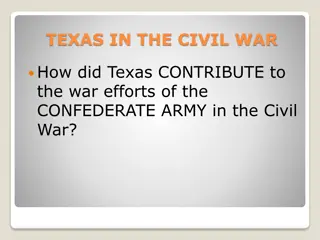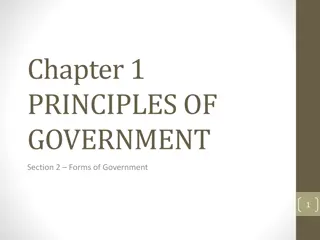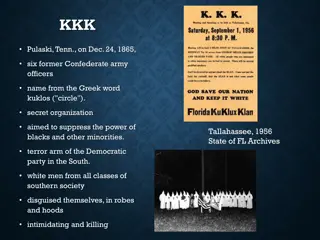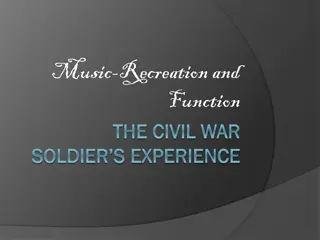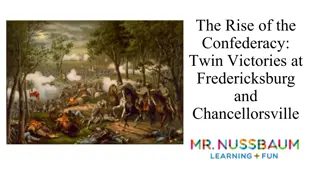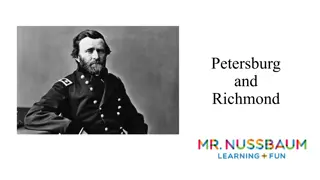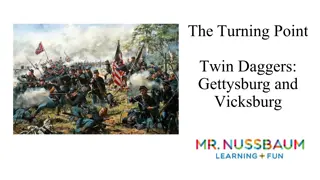Texas Contributions to the Confederate Army in the Civil War
Texas played a significant role in the Civil War by contributing soldiers to the Confederate Army. Governor Francis Lubbock led the state's efforts, organizing troops and sending units such as Hood's Texas Brigade and Terry's Texas Rangers to fight in key battles. Despite initial resistance to the d
0 views • 33 slides
Understanding Forms of Government Today
Different forms of government exist in the world today, classified based on characteristics like participation, power distribution, and branches of power. Democracies emphasize people's involvement, while dictatorships concentrate power. Governments can be unitary, federal, or confederate, and power
5 views • 17 slides
History and Impact of the Ku Klux Klan in the United States
The Ku Klux Klan (KKK) is a notorious secret organization founded in Pulaski, Tennessee, in 1865 by former Confederate army officers. Originally aimed at suppressing the power of blacks and minorities, the KKK evolved over the years with a goal to reestablish white supremacy. The Klan was responsibl
0 views • 5 slides
Music in the Civil War: Soldiers' Experience and Role
Music played a crucial role in the Civil War, serving beyond recreation to boost morale, provide comfort, and instill patriotism. Soldiers marched to the beat of instruments like the fife and drum, with popular songs carrying them through the hardships of war. Union and Confederate musicians created
0 views • 18 slides
The Battle of Antietam: Removal of Buell and McClellan from Command
The Battle of Antietam, also known as the Battle of Sharpsburg, had significant casualties with more killed or wounded in one day than in multiple previous wars. The battle involved key areas such as The Cornfield, The Woods, The Sunken Road, and Rohrbach Bridge. It ended as a tactical draw but a st
0 views • 18 slides
Twin Victories in the Rise of the Confederacy: Fredericksburg and Chancellorsville
The Civil War in late 1862 saw pivotal moments as the Union faced setbacks at Fredericksburg and Chancellorsville. After the Battle of Antietam, President Lincoln's Emancipation Proclamation set the stage for a shifting tide. The Union's struggles at Fredericksburg under Burnside led to Hooker's uns
0 views • 10 slides
Beekeeper's Vocabulary: Definitions in Detail
Explore the rich vocabulary of beekeeping with detailed definitions for words like austere, cadence, and confederate. Dive into examples and meanings to enhance your understanding and appreciation of these terms. Discover the intricate language associated with beekeeping practices and expand your kn
0 views • 45 slides
Texas's Role in the Civil War and Its Impact on the Confederacy
Explore Texas's contributions to the Confederacy during the Civil War, including key battles and historical events such as the resignation of Governor Houston. Learn how Texas supported the Confederate cause and analyze its significance in the overall war effort.
0 views • 6 slides
Life During the Civil War: Baseball, Ironclads, and Jackson
Soldiers in the Civil War found ways to pass the time amidst the chaos of battle, including playing baseball. The introduction of baseball was credited to General Abner Doubleday, with unique terms and rules for the game. Additionally, the battles of the ironclad ships Monitor and Merrimack showcase
0 views • 14 slides
The Siege of Petersburg and Richmond in the Civil War
Confederate forces faced major defeats at Gettysburg and Vicksburg, leading to a turning tide in favor of the Union. Ulysses S. Grant's Overland Campaign weakened Confederate forces, focusing on Petersburg as a critical supply line to Richmond. Despite initial failures, Union forces gradually extend
0 views • 9 slides
The Rise of the KKK: Origins, Objectives, and Decline
The Ku Klux Klan (KKK) was founded in Pulaski, Tennessee, in 1865 as a social club for former Confederate soldiers. Over time, it evolved into a terrorist organization with the goal of discouraging black people from holding positions of power and enforcing segregation through fear and violence. Desp
0 views • 13 slides
The Turning Point: Gettysburg and Vicksburg in the Civil War
President Lincoln issues the Emancipation Proclamation after the Battle of Antietam, setting the stage for significant events in the Civil War. The Union faces leadership changes and Confederate advances, leading to the pivotal Battle of Gettysburg in June 1863. The battle becomes the largest ever f
0 views • 12 slides
